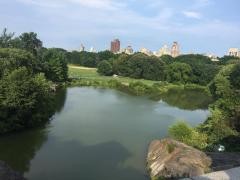World House Student Fellow Program Mauritania: Ignore At Your Own Peril
Basic Page Sidebar Menu Perry World House
November 16, 2017
By
Hani Warith
This summer, I worked at an international human rights organization researching the often forgotten Mauritania, a country facing a struggle between a civil society eager to reverse the country’s recent cycle of coups and dictatorships and its ruling establishment. While traditionally less-known, Mauritania is worth studying for anyone interested in analyzing larger trends in North Africa and the Middle East.
Policy analysts ignore Mauritania at their peril; attempts to put a greater emphasis on its diplomatic partnerships with the U.S.A, the European Union and regional allies could be an effective means to counter several threats facing the world at large. While often neglected in policy discussions, Mauritania is of geopolitical importance due to its location and resource rich desert. The country is located between Sub-Saharan Africa and the MENA region and has quietly become a focal point in the fight against Islamic immigration and efforts to control the flow of migrants between Africa and Europe.
Today, Mauritania is also home to the February 25 Movement, a loose coalition of activists that formed after widely ignored demonstrations, contemporaneous to the 2011 revolts in Egypt, Tunisia and elsewhere in the Arab world. It’s name comes from the date on which Mauritania’s protests began. This year, Mauritanian President Mohammed Ould Ematt’s attempts to centralize power through a referendum have sparked civic outrage that again brought the group back to the frontline of Mauritanian politics. Earlier this year he proposed a vote on constitutional amendments that would abolish the nation’s senate, a move that many analysts have claimed will precede a future attempt to run for a third term. In response, the February 25th Movement organized in dissent.
As I continued my research, it became clear I was studying dynamics that could possibly become widely observed across the region in the coming years and which in some ways already have been replicated in Morocco’s Amazigh protest movement, ongoing in its Rif Mountains.
Covering this group of gave me a window into an organization that has managed to survive for years under a regime widely categorized as repressive. Moreover, studying the activists has revealed an opposition movement that has been able to reconcile a broad platform of demands and interest groups. Activists within the coalition have protested on demands ranging from ending political corruption to enforcing the ban on slavery. Mauritania was the last country in the world to abolish slavery, in 1981.
Beyond Mauritanian’s experience with protest movements that have become increasingly common in the MENA region, the country has grappled considerably with inter-ethnic power sharing struggles that have been mirrored across the region. The country is dominated by three ethnic groups; Arabs, Moors and Afro-Mauritanians. While Arabs have dominated government, the February 25th movement has managed to create a broadly inclusive coalition whose existence has been sustained over several years. Its success in reaching across what are typically unassailable divisions offers a blueprint to other civil society groups attempting to mitigate similar distinctions in different MENA nations. By successfully negotiating a comprehensive platform that is broadly inclusive, the February 25th movement has been able to create a united Mauritanian opposition.
Ultimately, I started my summer eagerly expecting to contribute to research on a number of projects across the world. Given my interests in foreign policy and the Middle East doing such research seemed like a perfect fit for me. While I would get the chance to research the countries that interested me most, I also got exposure to a variety of challenges facing the Middle East. A lot of these discussions were quite emotionally tough; I reviewed video evidence of security forces clashing with protesters and covered countries in which arbitrary arrest was rife and civil society was crushed. Yet I was also reminded that policy analysis too frequently reduces the MENA region to a land of conflict, chaos and authoritarianism. My range of summer assignments brought me to researching Tunisia’s first LGBT periodical, Shams (meaning sun) Magazine and following the repeal of laws in parliaments across the region granting rapists who marry their victims legal amnesty.
My job brought me to researching the Amazigh uprising in Morocco’s Rif mountains and to the protest movement in Mauritania; dissent led by small pockets of activists in geographically isolated parts of the MENA region. While such phenomena may seem easy to ignore and very often are, they provide a window into understanding what opposition movements might be able to do to successfully bring government attention towards their demands. Both the Moroccan and Mauritanian protest movements have been able to successfully unify protesters in geographical regions that are sparsely populated. While I can’t focus on both in depth due to space constraints I encourage you to do further research into the protest movement in Morocco.
In short, my summer taught me that thinking about policy beyond the areas which most observers tend to focus is essential; by zooming in on these areas we can better understand how various states play a role in contributing to dynamics that we view to animate the global order. In mastering this information we are simply better equipped to formulate pragmatic recommendations to our most striking foreign policy challenges.


